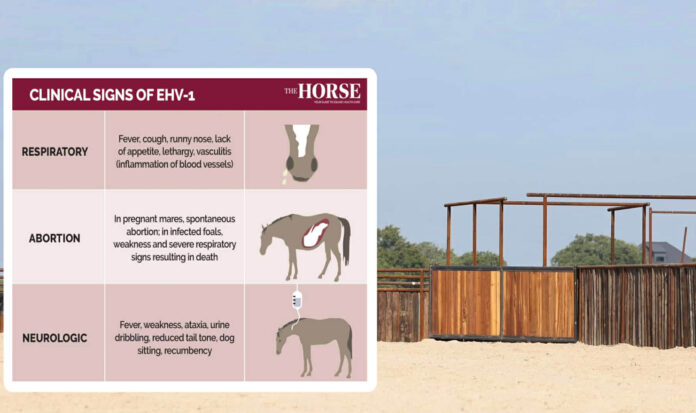ARIZONA — An outbreak of Equine Herpesvirus has been confirmed in New Mexico, where affected horses showed fever and neurologic symptoms. Additional minor cases have been reported in Arizona, all of which are currently under quarantine.
The horses attended the 2025 WPRA World Finals and Elite Barrel Race event in Waco, TX, on November 5-9, 2025. The horses in Oklahoma participated in the Barrel Futurities of America event in Guthrie, OK, on November 17-18, 2025, before the remainder of the event was canceled. TAHC and ODAFF staff are working closely with event coordinators, equine owners, and other states to respond to the outbreak and take measures to protect horses and prevent the further spread of the virus. Unfortunately, these events were attended by horses from many states, including Arizona and New Mexico.
According to reports from the Equine Disease Communication Center (EDCC) and state veterinarians, horses that attended the event in TX or were exposed to animals from the WPRA event have since tested positive for the virus. The illness can cause fever, respiratory issues, and, in severe cases, neurological disease. All affected facilities are under official quarantine as veterinarians monitor exposed horses.
In Maricopa County, the Arizona Department of Agriculture has confirmed EHV-1 cases in two separate outbreaks at private facilities.
The first outbreak, 7215 (Alert ID 4741), involves one confirmed horse and three exposed horses. The infected horse tested PCR-positive for the EHV-1 D752 strain via nasal swab but remains clinically normal, with no fever or neurologic signs.
The second outbreak, 7216 (Alert ID 4742), includes two confirmed cases and five exposed horses. Both infected horses tested PCR-positive for EHV-1 N752 and are clinically normal, with no fever or neurological symptoms.
In a letter from Ryan Wolker DVM, MVetSc, DACVS discussing the outbreak in Arizona, “these animals have NOT been sick or febrile, and none have displayed any evidence of neurologic disease to date. The virus was recovered on the nasal swab and/or whole blood samples, but the horses are not showing any illness. An encouraging feature is that the test results of these animals show Polymerase Chain Reaction (PCR) test cycle threshold (CT) values that are towards the upper end of the cutoff (typically 40), meaning very low levels of nasal viral shedding,” the letter stated.
In Eddy County, New Mexico, officials confirmed two additional cases of Equine Herpesvirus Myeloencephalopathy (EHM), the neurologic form of EHV-1, under Outbreak 7217 (Alert ID 4743). One horse that traveled to Waco, Texas, for the WPRA event tested PCR-positive for both nasal swab and blood samples and developed fever and neurologic symptoms.
A second horse that did not travel became ill after exposure, testing positive on blood and also showing fever and neurologic signs. Three additional horses were exposed, and the property remains under official quarantine.
All confirmed horses are linked to animals that had contact with the WPRA World Finals and Elite Barrel Race event. Both Arizona facilities and the facility in New Mexico remain under official quarantine with biosecurity protocols in place.
Several equine venues have postponed or cancelled shows and rodeos as a precaution. The Arizona Farm Bureau has advised horse owners to monitor for fevers above 101.5°F and report any clinical signs to their veterinarian immediately.
A major women’s roping event at West World of Scottsdale – the Kimes Ranch Million Dollar Breakaway and partner CN Productions Rising Stars competition scheduled for November 24-30 – has been postponed in light of the virus outbreak. Organizers announced the events will now run December 15-21 (or possibly be deferred to spring) to ensure equine health takes precedence.
Veterinarians warn that EHV-1 can appear in several forms—respiratory, reproductive, and neurologic. Symptoms can include fever, nasal discharge, coughing, weakness, and paralysis, while pregnant mares may experience abortion. Even healthy-looking horses can shed and transmit the virus through direct contact, shared water, or contaminated equipment.
State officials in both Arizona and New Mexico are urging horse owners to isolate all horses returning from the competition, monitor temperatures twice daily, disinfect trailers and tack, and contact a veterinarian immediately if fever or neurological symptoms appear.
Although no statewide movement restrictions have been issued, agricultural departments warn that event-related transmission remains a concern and emphasize the importance of strict on-site biosecurity measures.
The extent of this EHV-1 outbreak is not yet fully known. Measures to prevent horses from contracting the virus and to increase overall biosecurity are recommended.
For verified updates and national tracking, visit the Equine Disease Communication Center at
👉 https://equinediseasecc.org/news/article/Equine-Herpesvirus-Myeloencephalopathy-(EHM)-Outbreak.




